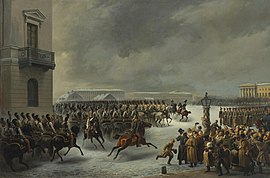 Piotr Skarga
Piotr Skarga (
February 2,
1536 [1] –
September 27,
1612 [2]; actual name:
Piotr Powęski; referred to in some English sources as
Peter Skarga) was a
Polish Jesuit,
preacher,
hagiographer,
polemicist, and leading figure of the
Counter-reformation in the
Polish-Lithuanian Commonwealth. He was called the "Polish
Bossuet" due to his oratorical abilities.
Educated at
Grójec and
Kraków, he began life as a tutor to the family of
Andrew Tenczynski, castellan of Kraków, and, some years later, after a visit to
Vienna, took orders, and from
1563 was attached to the cathedral church of
Lwów. His oratory was so successful that he determined to become a missionary-preacher among the people, in order the better to combat the social and political evils of the day. By way of preparation he studied
theology in
Italy from
1568 to
1570, and finally entered the Society of Jesus. On his return he preached successively at
Pultusk,
Jaroslaw, and
Plock under the powerful protection of
Queen Anna Jagiellon. During a subsequent mission to Lithuania he converted numerous noble families, including the
Radziwills.
He became the first
rector of the
Vilnius Academy in
1579, where he wrote the
Lives of the Saints (
Żywoty świętych), which is still popular reading today. In
1584 he was transferred to the new Jesuit College at Kraków, and in
1588 he became court preacher to King
Sigismund III Vasa (a position he would hold until
1611), and thus sometimes preached to the
Sejm (parliament). The
nobility (Polish:
szlachta) ascribed to him a great (and baleful: he advocated strong royal authority) influence on King Sigismund.
Skarga is remembered by Poles as a vigorous early advocate of reforms to the
Polish-Lithuanian polity and as a critic of the Commonwealth's governing classes. He advocated the strengthening of the
monarch's power at the expense of
Sejm,
magnates and szlachta.
His name "Skarga", which in Polish means, "accusation", is likely because of this career as a reformer and critic. The loose translation of his name would therefore be "Peter the Accuser".
He established or enlarged many Catholic charitable societies and Jesuit schools.
 Prominent writings Lives of the Saints
Prominent writings Lives of the Saints (
Żywoty świętych, 1579, 8 editions in his lifetime).
Sejm Sermons (
Kazania sejmowe, 1597, published posthumously).
Soldiers' Devotions (
Żołnierskie nabożeństwo, 1618).
 Current members
Current members

 Prominent writings
Prominent writings
 The era of Russian palace revolutions
The era of Russian palace revolutions
